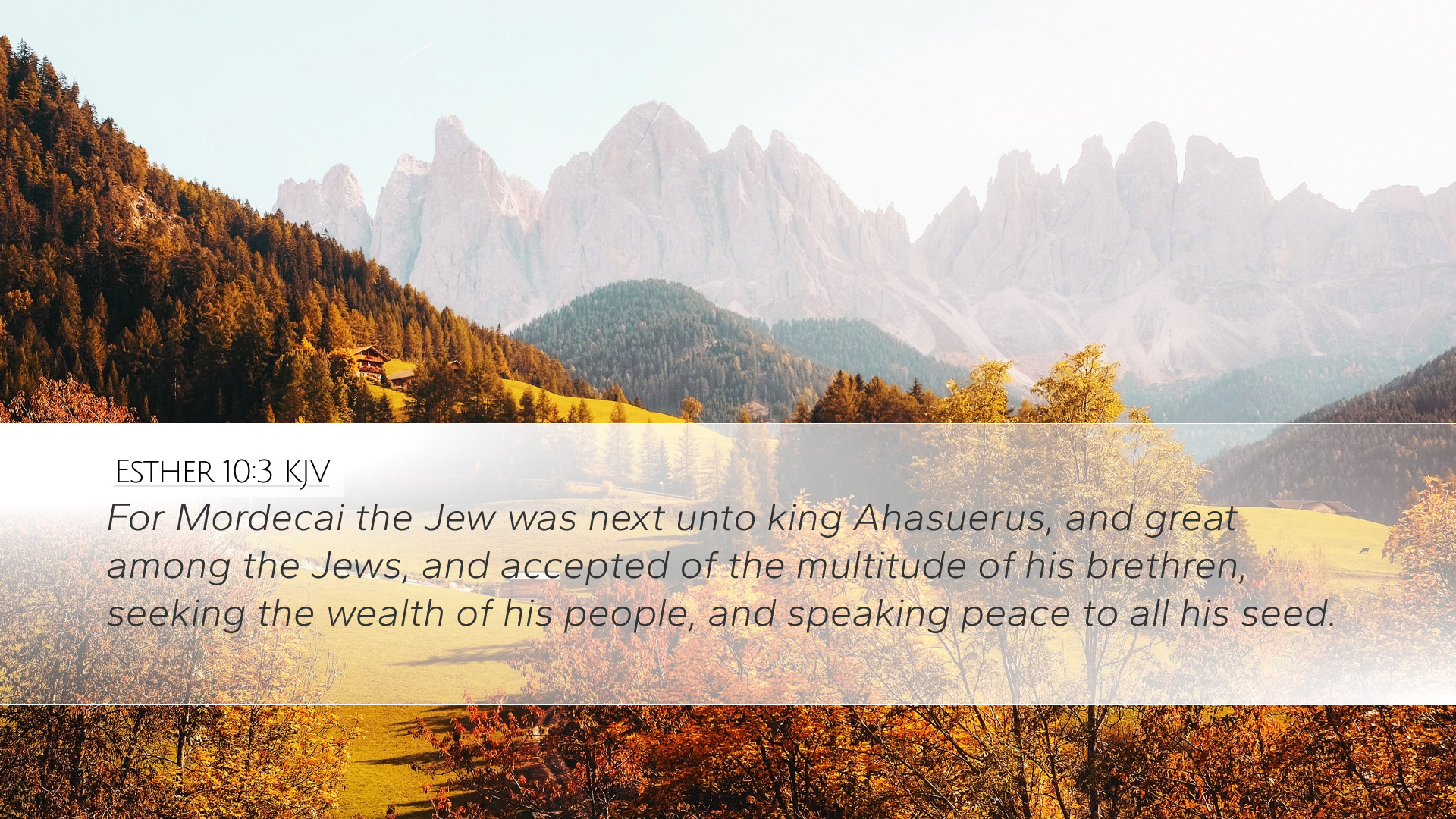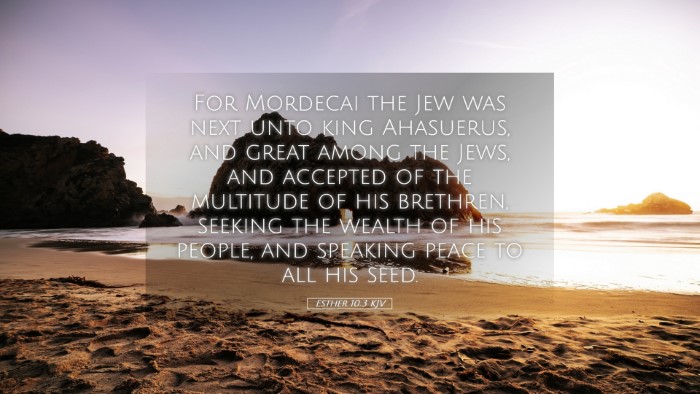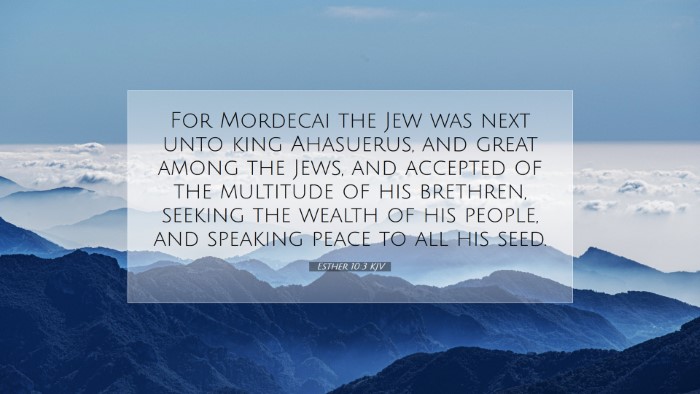Old Testament
Genesis Exodus Leviticus Numbers Deuteronomy Joshua Judges Ruth 1 Samuel 2 Samuel 1 Kings 2 Kings 1 Chronicles 2 Chronicles Ezra Nehemiah Esther Job Psalms Proverbs Ecclesiastes Song of Solomon Isaiah Jeremiah Lamentations Ezekiel Daniel Hosea Joel Amos Obadiah Jonah Micah Nahum Habakkuk Zephaniah Haggai Zechariah MalachiEsther 10:3
Esther 10:3 KJV
For Mordecai the Jew was next unto king Ahasuerus, and great among the Jews, and accepted of the multitude of his brethren, seeking the wealth of his people, and speaking peace to all his seed.
Esther 10:3 Bible Commentary
Commentary on Esther 10:3
Esther 10:3 (KJV): “For Mordecai the Jew was next unto king Ahasuerus, and great among the Jews, and accepted of the multitude of his brethren, seeking the wealth of his people, and speaking peace to all his seed.”
Introduction
The conclusion of the Book of Esther encapsulates the profound themes of providence, loyalty, and the social dynamics within the Hebrew community during their captivity in Persia. Mordecai's elevation and his relationship with King Ahasuerus serve as a capstone to this narrative, reflecting the favor that can arise from fidelity and courage in the face of adversity.
The Significance of Mordecai's Position
Mordecai's Proximity to Power: As noted by Matthew Henry, Mordecai's position “next unto king Ahasuerus” underscores a remarkable shift in fortunes for the Jews in Persia. Once threatened with annihilation through Haman's scheme, they are now represented at the highest levels of power. This reflects the larger theme of divine providence where God turns the tables on their enemies.
Mordecai's Influence: According to Albert Barnes, Mordecai's role was not solely as a courtier but also as a protector and advocate for his people. His acceptance among the Jews as “great among the Jews” indicates a leadership role marked by personal sacrifice and public service. Mordecai is seen as a figure who genuinely seeks the welfare of his people, a characteristic that established him as a pivotal leader in Jerusalem’s diasporic community.
Thematic Elements
-
Leadership and Responsibility:
Adam Clarke comments on Mordecai’s ‘seeking the wealth of his people.’ Such leadership involves more than mere influence; it encompasses a responsibility to ensure the upliftment and prosperity of one’s community. Mordecai’s proactive stance on behalf of the Jews highlights the attributes of a godly leader who aligns his personal ambitions with the welfare of his people.
-
Peace and Reconciliation:
Additionally, Mordecai’s “speaking peace to all his seed” is a feature that embodies Christ-like leadership, aiming for harmony within the community. The peace he advocates is not just the absence of conflict but an active pursuit of well-being and restoration among the Jews.
-
Encouragement and Remembrance:
The mention of Mordecai being “accepted of the multitude of his brethren” reinforces the idea that recognition and acceptance within one’s community are a vital aspect of leadership. In times of distress, such acceptance can be a source of great motivation and resilience for the people under his care.
Applications for Today’s Believers
The timely message from Esther 10:3 for today’s church can be summarized in several ways:
-
Faithfulness in Adversity:
Just as Mordecai remained faithful and courageous despite Haman's edict, believers are encouraged to trust in God's plan even during trials. The story demonstrates that faithfulness often leads to divine favor and unexpected blessings.
-
Servant Leadership:
Mordecai’s model of leadership—serving his people and advocating for their well-being—serves as a paradigm for church leaders today. Leaders are called to prioritize the needs of their congregation above their ambitions.
-
The Power of Unity:
The acceptance of Mordecai by the Jewish community highlights the importance of unity among believers. In a world rife with division, the body of Christ is called to pursue peace and mutual support.
Conclusion
Esther 10:3 encapsulates the powerful ending of a narrative filled with tension and divine intervention. The reversal of fortunes for the Jews, highlighted through Mordecai’s elevation, serves as a timeless reminder of God’s sovereignty and faithfulness. Mordecai's example as a leader who sought the good of his people stands as a model for all who are called to lead, whether in the church or broader society. In navigating the complexities of leadership, the pursuit of peace and the well-being of one’s community must be at the forefront, ensuring that one's legacy fosters enduring blessing and hope.


